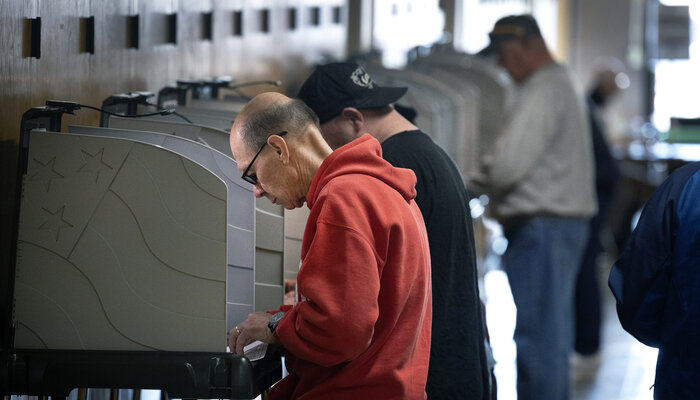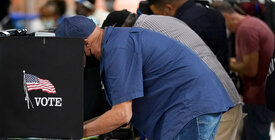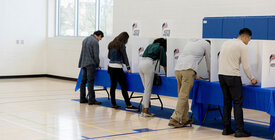
In 2025, state legislatures enacted at least 31 restrictive voting laws, the second highest total since the Brennan Center began tracking this legislation in 2011. At the same time, state legislatures enacted at least 30 expansive voting laws, in a departure from recent years, when the country saw significantly more expansive laws enacted in a given year than restrictive laws. Thirty of the 31 restrictive laws and all 30 expansive laws will be in effect for the 2026 midterms, and parts of the remaining restrictive law will also be in effect.
Between January 1 and December 31, 2025:
- At least 16 states1 enacted 31 restrictive voting laws.2 Of those laws, 30 will be in effect for the 2026 midterms, as will parts of the remaining one.3 Overall, lawmakers in at least 47 states considered at least 486 restrictive voting bills in 2025.4
- At least 7 states5 enacted 8 election interference laws, all of which were enacted before our prior roundup in October 2025 and will be in effect for the midterms.6 Overall, lawmakers in at least 31 states considered 129 election interference bills in 2025.
- At least 25 states7 enacted 30 expansive voting laws in 2025, with no new additional expansive laws enacted since October.8 All 30 of those laws will be in effect for the midterms. Overall, lawmakers in all 50 states considered at least 631 expansive bills in 2025.
- 12 of the 25 states that enacted expansive voting laws also enacted at least one restrictive law.
Following a presidential election that was rife with voting-related conspiracy theories, 2021 set the record for the most restrictive voting laws passed by states since the Brennan Center began tracking them. Yet in 2025, states enacted almost the same number of laws despite the fact that the 2024 presidential election results were unchallenged. This suggests that passing laws that make it harder for eligible Americans to vote is an ongoing policy project in some of the states rather than a reaction to a one-time event. Notably, however, only one of last year’s restrictive laws is as sweeping as omnibus restrictive laws enacted in Florida, Georgia, Iowa, and Texas in 2021.
In another departure from 2021 and other recent years, the restrictive laws enacted last year outnumbered the expansive laws. In 2021, states enacted at least 62 expansive voting laws, more than double the 30 expansive laws enacted in 2025. Indeed, every other year from 2021 through 2024 had at least 1.5 times as many expansive laws enacted as restrictive ones.
This roundup also looks ahead to what may happen in 2026. Some states allow legislators to pre-file bills for the following year’s session in the fall, and some states permit legislators to carry over pending bills from one year to the next. Although some states’ legislative sessions are shorter in even-numbered years, and a few legislatures won’t meet, the pre-filed bills and carryovers provide an indication of what changes to election laws may be coming with federal elections looming in November.
Endnotes
-
1
Arkansas, Florida, Idaho, Indiana, Kansas, Kentucky, Montana, North Dakota, Ohio, Oklahoma, South Dakota, Tennessee, Texas, Utah, West Virginia, and Wyoming.
-
2
Legislation is categorized as restrictive if it contains one or more provisions that would make it harder for eligible Americans to register, stay on the voter rolls, or vote compared to existing state law.
-
3
We describe laws with effective dates before November 3, 2026, as “will be in effect,” however, some may not be operative for the midterms due to legal challenges. Courts may block some of these laws before the midterms, while in other cases, court blockages could be overturned on appeal.
-
4
Hawaii, Louisiana, and Vermont are the exceptions. Vermont was also the only state not to introduce a restrictive bill in 2021, and Delaware, Kentucky, and Vermont were the 3 not to do so in 2023. Louisiana is, however, among 7 states that have enacted election interference legislation (LA H.B. 502).
-
5
Indiana, Iowa, Kansas, Louisiana, New Hampshire, Texas, and Utah.
-
6
Legislation is categorized as election interference if it either threatens the people and processes that make elections work or increases opportunities for partisan interference in election results or administration.
-
7
Arkansas, California, Colorado, Connecticut, Hawaii, Idaho, Iowa, Kentucky, Maine, Maryland, Nevada, New Hampshire, New Jersey, North Dakota, Ohio, Oklahoma, Rhode Island, South Dakota, Tennessee, Texas, Utah, Virginia, Washington, West Virginia, and Wyoming.
-
8
Legislation is categorized as expansive if it contains one or more provisions that would make it easier for eligible Americans to register, stay on the voter rolls, or vote compared to existing state law.




